Impact of Sociocultural Factors on Refugee Mental Health: A Report
VerifiedAdded on 2020/11/23
|11
|2949
|391
Report
AI Summary
This report examines the mental health challenges faced by asylum-seekers and refugees, exploring the reasons for displacement, including war, persecution, and economic hardship. It delves into the various issues these individuals encounter, such as legal, cultural, and ethical challenges, which significantly impact their mental well-being. The report highlights the complexities of navigating new environments, the loss of social support, and the difficulties in accessing appropriate healthcare services. It emphasizes the importance of understanding cultural differences to provide effective psychiatric diagnoses and addresses specific challenges faced in countries like Australia, including finding housing, employment, and overcoming language barriers. The report concludes by underscoring the need for comprehensive support systems and culturally sensitive interventions to address the mental health needs of this vulnerable population.
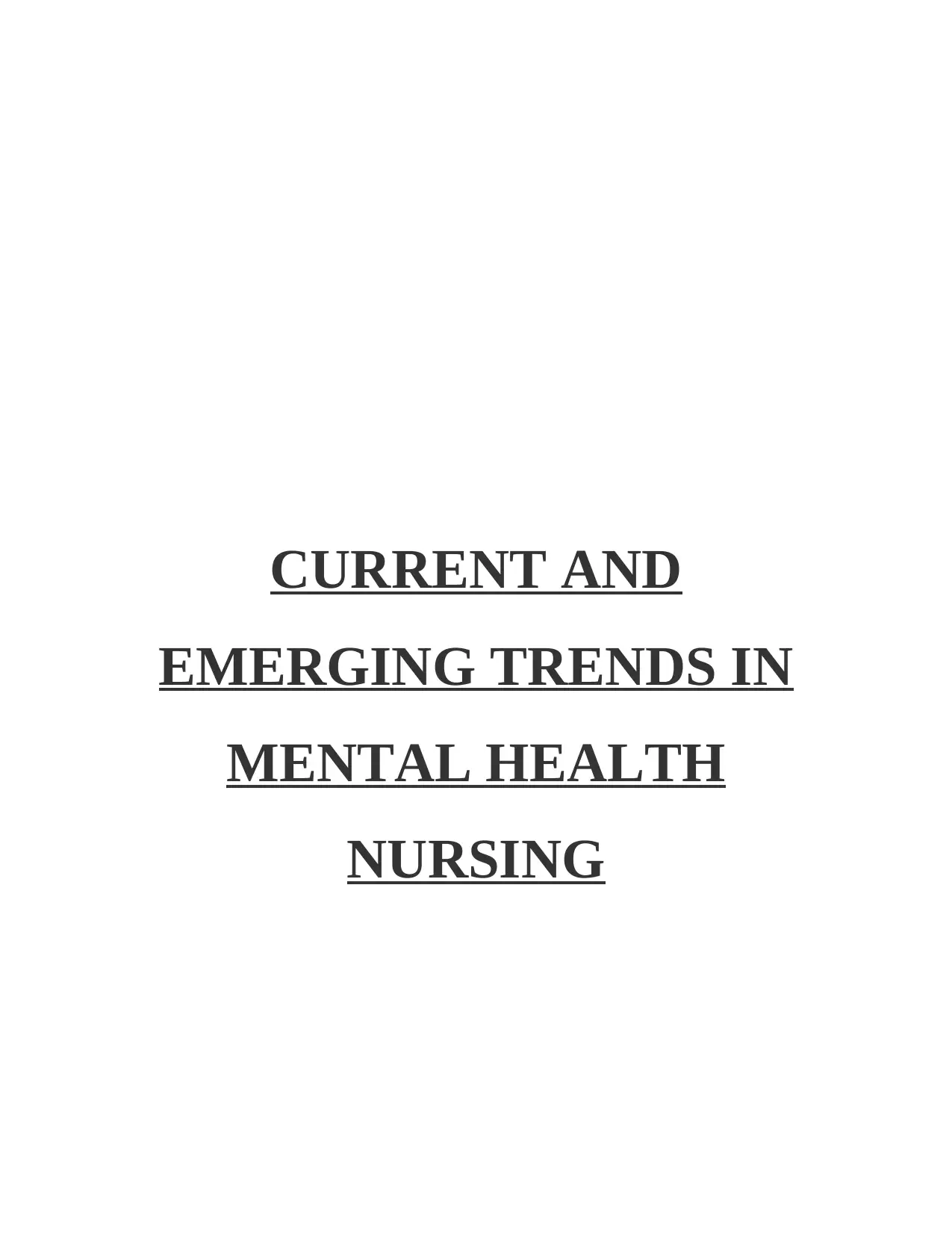
CURRENT AND
EMERGING TRENDS IN
MENTAL HEALTH
NURSING
EMERGING TRENDS IN
MENTAL HEALTH
NURSING
Paraphrase This Document
Need a fresh take? Get an instant paraphrase of this document with our AI Paraphraser
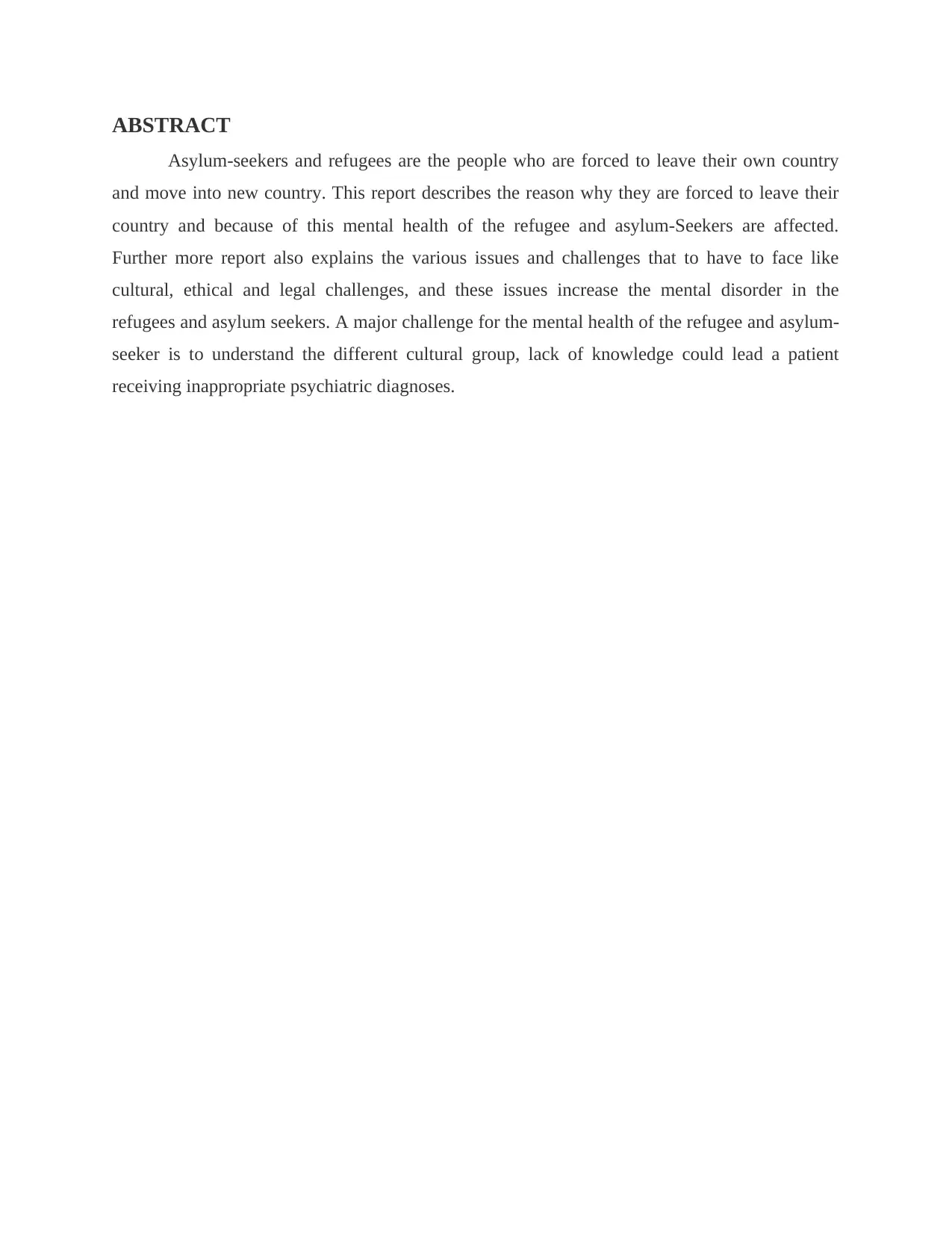
ABSTRACT
Asylum-seekers and refugees are the people who are forced to leave their own country
and move into new country. This report describes the reason why they are forced to leave their
country and because of this mental health of the refugee and asylum-Seekers are affected.
Further more report also explains the various issues and challenges that to have to face like
cultural, ethical and legal challenges, and these issues increase the mental disorder in the
refugees and asylum seekers. A major challenge for the mental health of the refugee and asylum-
seeker is to understand the different cultural group, lack of knowledge could lead a patient
receiving inappropriate psychiatric diagnoses.
Asylum-seekers and refugees are the people who are forced to leave their own country
and move into new country. This report describes the reason why they are forced to leave their
country and because of this mental health of the refugee and asylum-Seekers are affected.
Further more report also explains the various issues and challenges that to have to face like
cultural, ethical and legal challenges, and these issues increase the mental disorder in the
refugees and asylum seekers. A major challenge for the mental health of the refugee and asylum-
seeker is to understand the different cultural group, lack of knowledge could lead a patient
receiving inappropriate psychiatric diagnoses.
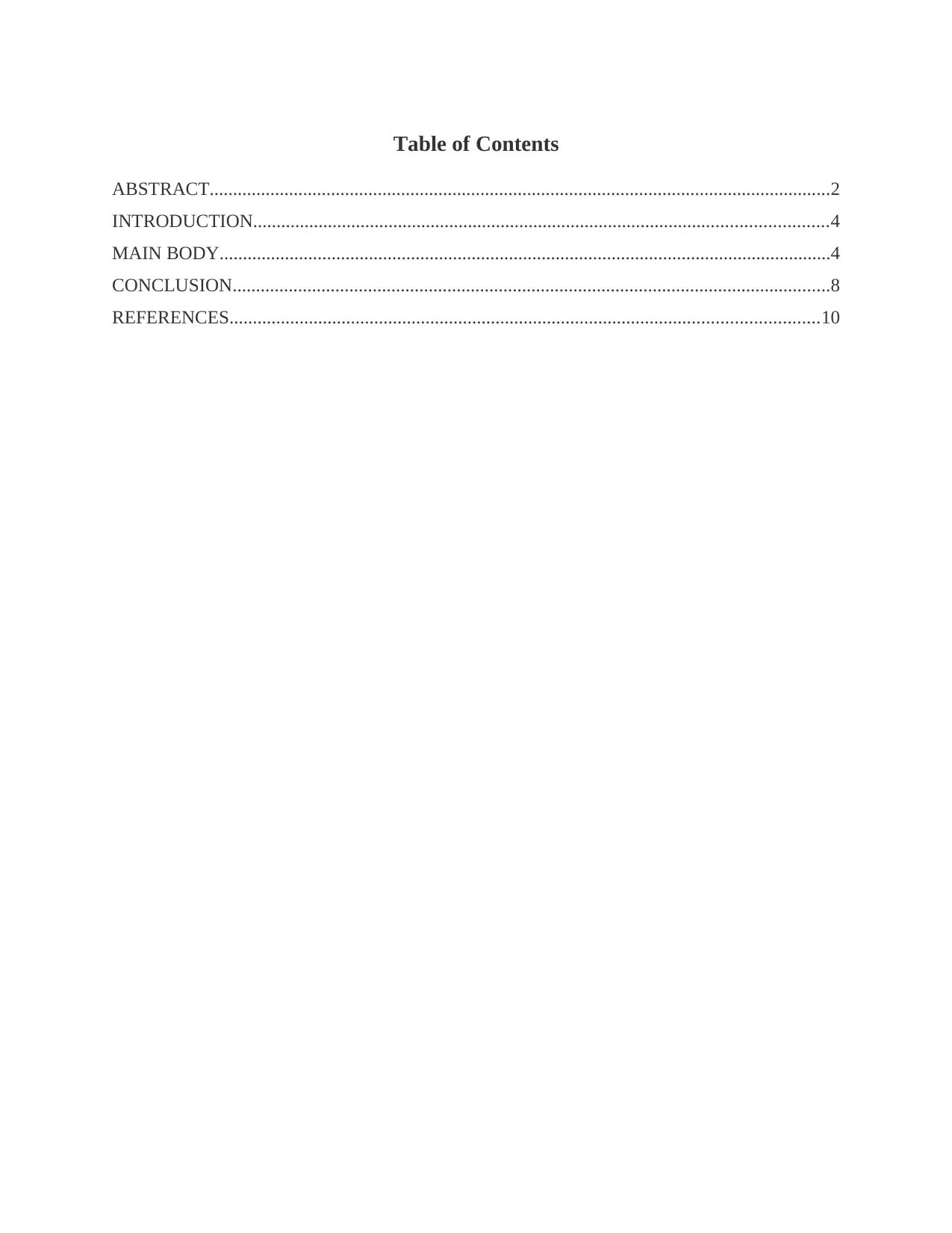
Table of Contents
ABSTRACT.....................................................................................................................................2
INTRODUCTION...........................................................................................................................4
MAIN BODY...................................................................................................................................4
CONCLUSION................................................................................................................................8
REFERENCES..............................................................................................................................10
ABSTRACT.....................................................................................................................................2
INTRODUCTION...........................................................................................................................4
MAIN BODY...................................................................................................................................4
CONCLUSION................................................................................................................................8
REFERENCES..............................................................................................................................10
⊘ This is a preview!⊘
Do you want full access?
Subscribe today to unlock all pages.

Trusted by 1+ million students worldwide
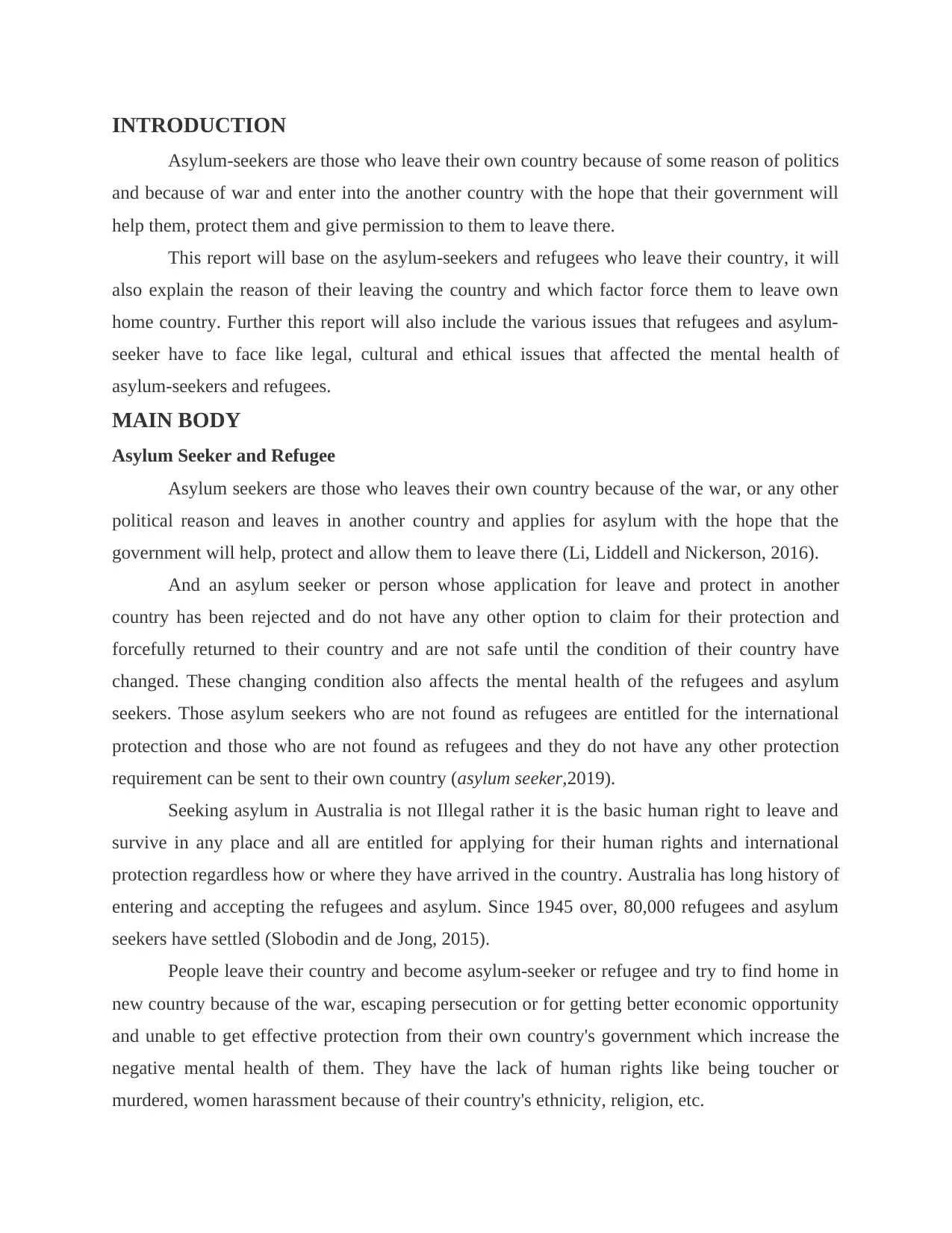
INTRODUCTION
Asylum-seekers are those who leave their own country because of some reason of politics
and because of war and enter into the another country with the hope that their government will
help them, protect them and give permission to them to leave there.
This report will base on the asylum-seekers and refugees who leave their country, it will
also explain the reason of their leaving the country and which factor force them to leave own
home country. Further this report will also include the various issues that refugees and asylum-
seeker have to face like legal, cultural and ethical issues that affected the mental health of
asylum-seekers and refugees.
MAIN BODY
Asylum Seeker and Refugee
Asylum seekers are those who leaves their own country because of the war, or any other
political reason and leaves in another country and applies for asylum with the hope that the
government will help, protect and allow them to leave there (Li, Liddell and Nickerson, 2016).
And an asylum seeker or person whose application for leave and protect in another
country has been rejected and do not have any other option to claim for their protection and
forcefully returned to their country and are not safe until the condition of their country have
changed. These changing condition also affects the mental health of the refugees and asylum
seekers. Those asylum seekers who are not found as refugees are entitled for the international
protection and those who are not found as refugees and they do not have any other protection
requirement can be sent to their own country (asylum seeker,2019).
Seeking asylum in Australia is not Illegal rather it is the basic human right to leave and
survive in any place and all are entitled for applying for their human rights and international
protection regardless how or where they have arrived in the country. Australia has long history of
entering and accepting the refugees and asylum. Since 1945 over, 80,000 refugees and asylum
seekers have settled (Slobodin and de Jong, 2015).
People leave their country and become asylum-seeker or refugee and try to find home in
new country because of the war, escaping persecution or for getting better economic opportunity
and unable to get effective protection from their own country's government which increase the
negative mental health of them. They have the lack of human rights like being toucher or
murdered, women harassment because of their country's ethnicity, religion, etc.
Asylum-seekers are those who leave their own country because of some reason of politics
and because of war and enter into the another country with the hope that their government will
help them, protect them and give permission to them to leave there.
This report will base on the asylum-seekers and refugees who leave their country, it will
also explain the reason of their leaving the country and which factor force them to leave own
home country. Further this report will also include the various issues that refugees and asylum-
seeker have to face like legal, cultural and ethical issues that affected the mental health of
asylum-seekers and refugees.
MAIN BODY
Asylum Seeker and Refugee
Asylum seekers are those who leaves their own country because of the war, or any other
political reason and leaves in another country and applies for asylum with the hope that the
government will help, protect and allow them to leave there (Li, Liddell and Nickerson, 2016).
And an asylum seeker or person whose application for leave and protect in another
country has been rejected and do not have any other option to claim for their protection and
forcefully returned to their country and are not safe until the condition of their country have
changed. These changing condition also affects the mental health of the refugees and asylum
seekers. Those asylum seekers who are not found as refugees are entitled for the international
protection and those who are not found as refugees and they do not have any other protection
requirement can be sent to their own country (asylum seeker,2019).
Seeking asylum in Australia is not Illegal rather it is the basic human right to leave and
survive in any place and all are entitled for applying for their human rights and international
protection regardless how or where they have arrived in the country. Australia has long history of
entering and accepting the refugees and asylum. Since 1945 over, 80,000 refugees and asylum
seekers have settled (Slobodin and de Jong, 2015).
People leave their country and become asylum-seeker or refugee and try to find home in
new country because of the war, escaping persecution or for getting better economic opportunity
and unable to get effective protection from their own country's government which increase the
negative mental health of them. They have the lack of human rights like being toucher or
murdered, women harassment because of their country's ethnicity, religion, etc.
Paraphrase This Document
Need a fresh take? Get an instant paraphrase of this document with our AI Paraphraser
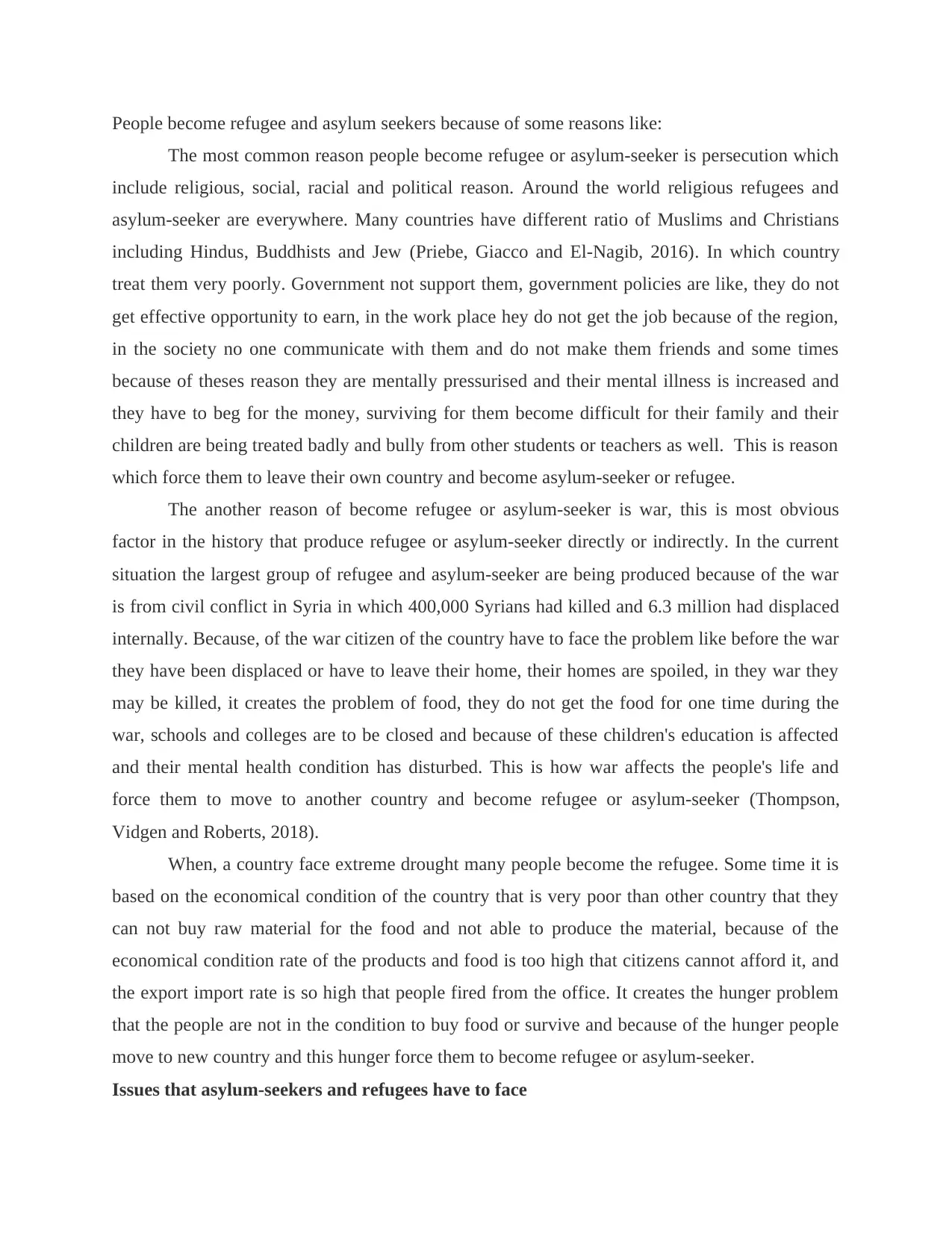
People become refugee and asylum seekers because of some reasons like:
The most common reason people become refugee or asylum-seeker is persecution which
include religious, social, racial and political reason. Around the world religious refugees and
asylum-seeker are everywhere. Many countries have different ratio of Muslims and Christians
including Hindus, Buddhists and Jew (Priebe, Giacco and El-Nagib, 2016). In which country
treat them very poorly. Government not support them, government policies are like, they do not
get effective opportunity to earn, in the work place hey do not get the job because of the region,
in the society no one communicate with them and do not make them friends and some times
because of theses reason they are mentally pressurised and their mental illness is increased and
they have to beg for the money, surviving for them become difficult for their family and their
children are being treated badly and bully from other students or teachers as well. This is reason
which force them to leave their own country and become asylum-seeker or refugee.
The another reason of become refugee or asylum-seeker is war, this is most obvious
factor in the history that produce refugee or asylum-seeker directly or indirectly. In the current
situation the largest group of refugee and asylum-seeker are being produced because of the war
is from civil conflict in Syria in which 400,000 Syrians had killed and 6.3 million had displaced
internally. Because, of the war citizen of the country have to face the problem like before the war
they have been displaced or have to leave their home, their homes are spoiled, in they war they
may be killed, it creates the problem of food, they do not get the food for one time during the
war, schools and colleges are to be closed and because of these children's education is affected
and their mental health condition has disturbed. This is how war affects the people's life and
force them to move to another country and become refugee or asylum-seeker (Thompson,
Vidgen and Roberts, 2018).
When, a country face extreme drought many people become the refugee. Some time it is
based on the economical condition of the country that is very poor than other country that they
can not buy raw material for the food and not able to produce the material, because of the
economical condition rate of the products and food is too high that citizens cannot afford it, and
the export import rate is so high that people fired from the office. It creates the hunger problem
that the people are not in the condition to buy food or survive and because of the hunger people
move to new country and this hunger force them to become refugee or asylum-seeker.
Issues that asylum-seekers and refugees have to face
The most common reason people become refugee or asylum-seeker is persecution which
include religious, social, racial and political reason. Around the world religious refugees and
asylum-seeker are everywhere. Many countries have different ratio of Muslims and Christians
including Hindus, Buddhists and Jew (Priebe, Giacco and El-Nagib, 2016). In which country
treat them very poorly. Government not support them, government policies are like, they do not
get effective opportunity to earn, in the work place hey do not get the job because of the region,
in the society no one communicate with them and do not make them friends and some times
because of theses reason they are mentally pressurised and their mental illness is increased and
they have to beg for the money, surviving for them become difficult for their family and their
children are being treated badly and bully from other students or teachers as well. This is reason
which force them to leave their own country and become asylum-seeker or refugee.
The another reason of become refugee or asylum-seeker is war, this is most obvious
factor in the history that produce refugee or asylum-seeker directly or indirectly. In the current
situation the largest group of refugee and asylum-seeker are being produced because of the war
is from civil conflict in Syria in which 400,000 Syrians had killed and 6.3 million had displaced
internally. Because, of the war citizen of the country have to face the problem like before the war
they have been displaced or have to leave their home, their homes are spoiled, in they war they
may be killed, it creates the problem of food, they do not get the food for one time during the
war, schools and colleges are to be closed and because of these children's education is affected
and their mental health condition has disturbed. This is how war affects the people's life and
force them to move to another country and become refugee or asylum-seeker (Thompson,
Vidgen and Roberts, 2018).
When, a country face extreme drought many people become the refugee. Some time it is
based on the economical condition of the country that is very poor than other country that they
can not buy raw material for the food and not able to produce the material, because of the
economical condition rate of the products and food is too high that citizens cannot afford it, and
the export import rate is so high that people fired from the office. It creates the hunger problem
that the people are not in the condition to buy food or survive and because of the hunger people
move to new country and this hunger force them to become refugee or asylum-seeker.
Issues that asylum-seekers and refugees have to face
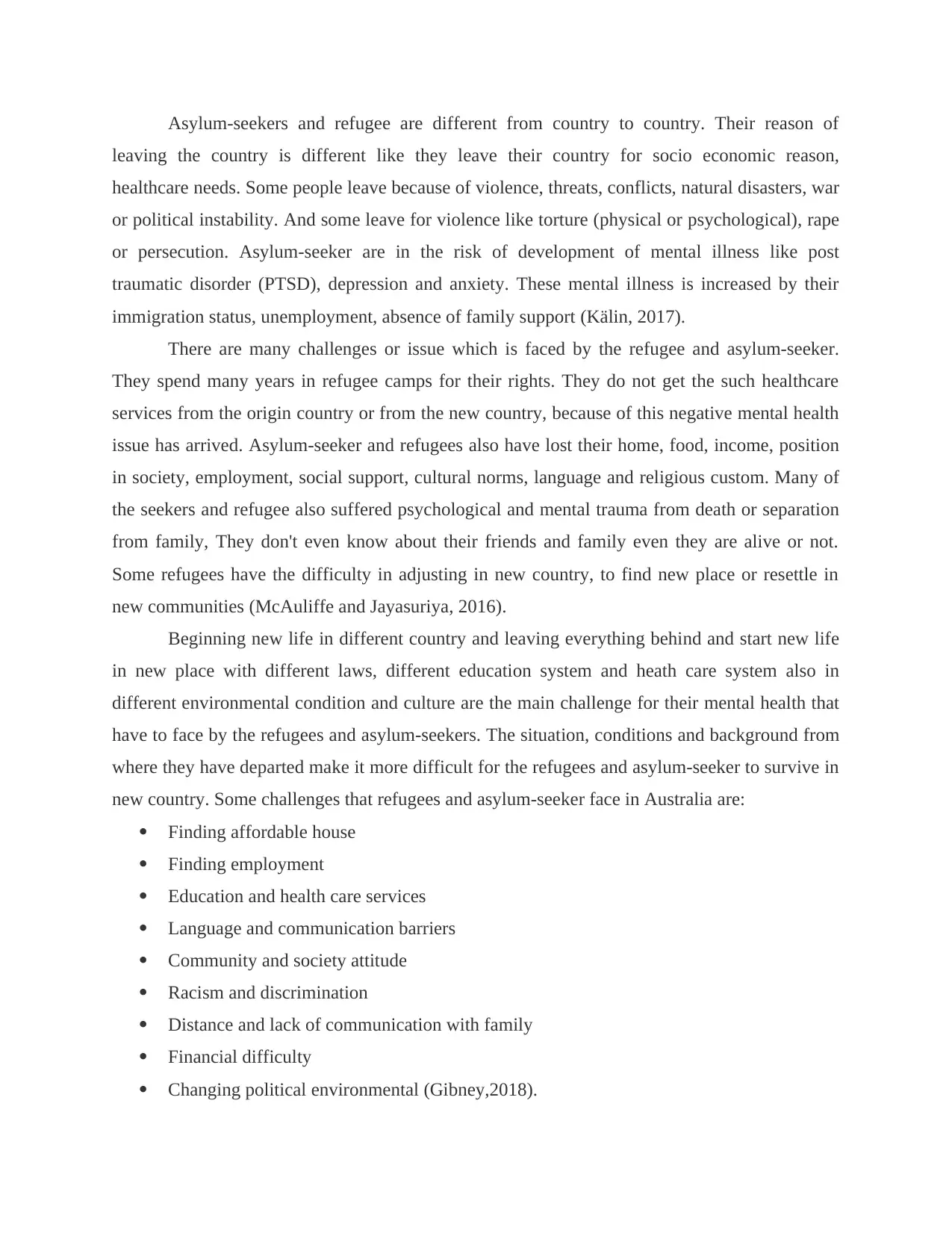
Asylum-seekers and refugee are different from country to country. Their reason of
leaving the country is different like they leave their country for socio economic reason,
healthcare needs. Some people leave because of violence, threats, conflicts, natural disasters, war
or political instability. And some leave for violence like torture (physical or psychological), rape
or persecution. Asylum-seeker are in the risk of development of mental illness like post
traumatic disorder (PTSD), depression and anxiety. These mental illness is increased by their
immigration status, unemployment, absence of family support (Kälin, 2017).
There are many challenges or issue which is faced by the refugee and asylum-seeker.
They spend many years in refugee camps for their rights. They do not get the such healthcare
services from the origin country or from the new country, because of this negative mental health
issue has arrived. Asylum-seeker and refugees also have lost their home, food, income, position
in society, employment, social support, cultural norms, language and religious custom. Many of
the seekers and refugee also suffered psychological and mental trauma from death or separation
from family, They don't even know about their friends and family even they are alive or not.
Some refugees have the difficulty in adjusting in new country, to find new place or resettle in
new communities (McAuliffe and Jayasuriya, 2016).
Beginning new life in different country and leaving everything behind and start new life
in new place with different laws, different education system and heath care system also in
different environmental condition and culture are the main challenge for their mental health that
have to face by the refugees and asylum-seekers. The situation, conditions and background from
where they have departed make it more difficult for the refugees and asylum-seeker to survive in
new country. Some challenges that refugees and asylum-seeker face in Australia are:
Finding affordable house
Finding employment
Education and health care services
Language and communication barriers
Community and society attitude
Racism and discrimination
Distance and lack of communication with family
Financial difficulty
Changing political environmental (Gibney,2018).
leaving the country is different like they leave their country for socio economic reason,
healthcare needs. Some people leave because of violence, threats, conflicts, natural disasters, war
or political instability. And some leave for violence like torture (physical or psychological), rape
or persecution. Asylum-seeker are in the risk of development of mental illness like post
traumatic disorder (PTSD), depression and anxiety. These mental illness is increased by their
immigration status, unemployment, absence of family support (Kälin, 2017).
There are many challenges or issue which is faced by the refugee and asylum-seeker.
They spend many years in refugee camps for their rights. They do not get the such healthcare
services from the origin country or from the new country, because of this negative mental health
issue has arrived. Asylum-seeker and refugees also have lost their home, food, income, position
in society, employment, social support, cultural norms, language and religious custom. Many of
the seekers and refugee also suffered psychological and mental trauma from death or separation
from family, They don't even know about their friends and family even they are alive or not.
Some refugees have the difficulty in adjusting in new country, to find new place or resettle in
new communities (McAuliffe and Jayasuriya, 2016).
Beginning new life in different country and leaving everything behind and start new life
in new place with different laws, different education system and heath care system also in
different environmental condition and culture are the main challenge for their mental health that
have to face by the refugees and asylum-seekers. The situation, conditions and background from
where they have departed make it more difficult for the refugees and asylum-seeker to survive in
new country. Some challenges that refugees and asylum-seeker face in Australia are:
Finding affordable house
Finding employment
Education and health care services
Language and communication barriers
Community and society attitude
Racism and discrimination
Distance and lack of communication with family
Financial difficulty
Changing political environmental (Gibney,2018).
⊘ This is a preview!⊘
Do you want full access?
Subscribe today to unlock all pages.

Trusted by 1+ million students worldwide
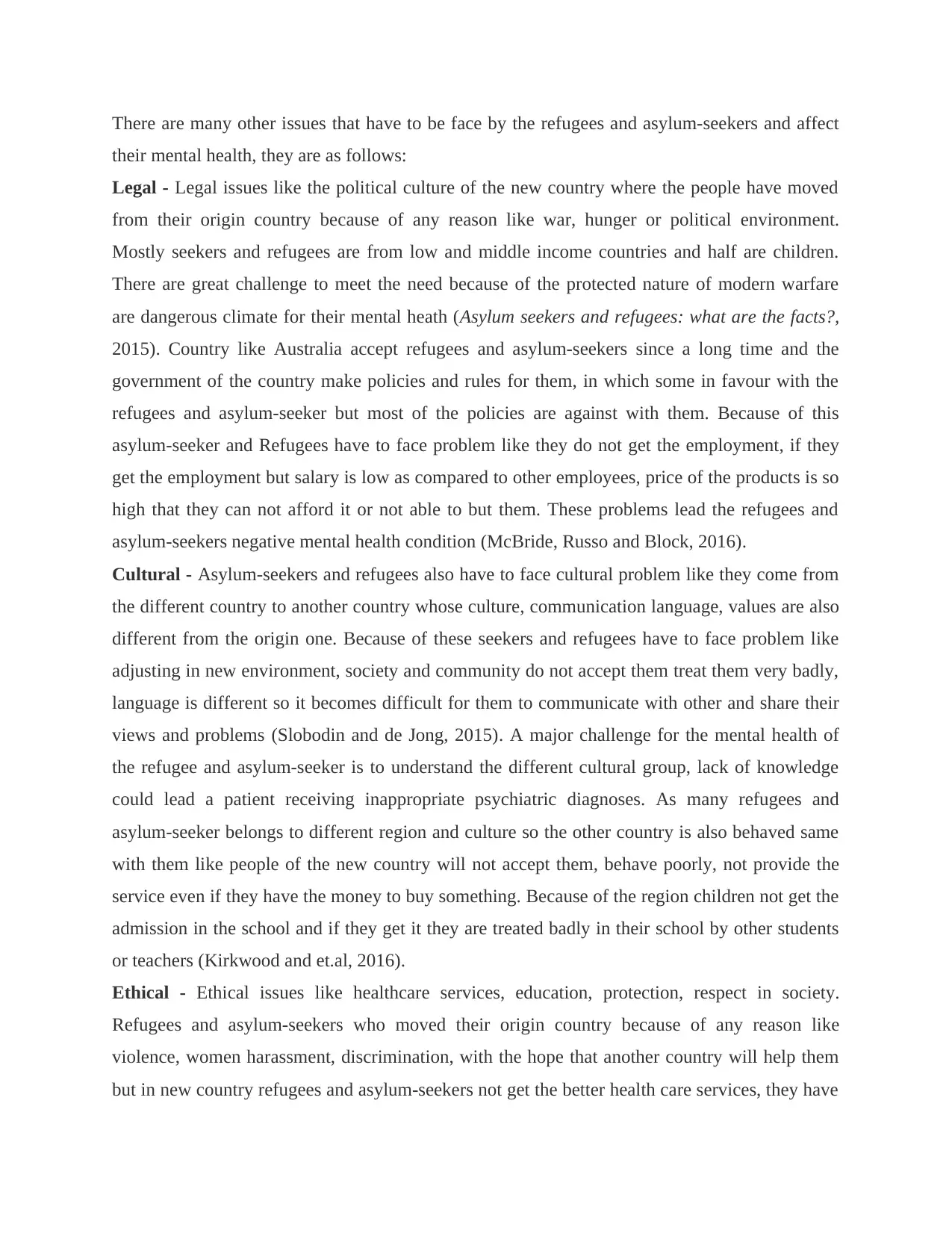
There are many other issues that have to be face by the refugees and asylum-seekers and affect
their mental health, they are as follows:
Legal - Legal issues like the political culture of the new country where the people have moved
from their origin country because of any reason like war, hunger or political environment.
Mostly seekers and refugees are from low and middle income countries and half are children.
There are great challenge to meet the need because of the protected nature of modern warfare
are dangerous climate for their mental heath (Asylum seekers and refugees: what are the facts?,
2015). Country like Australia accept refugees and asylum-seekers since a long time and the
government of the country make policies and rules for them, in which some in favour with the
refugees and asylum-seeker but most of the policies are against with them. Because of this
asylum-seeker and Refugees have to face problem like they do not get the employment, if they
get the employment but salary is low as compared to other employees, price of the products is so
high that they can not afford it or not able to but them. These problems lead the refugees and
asylum-seekers negative mental health condition (McBride, Russo and Block, 2016).
Cultural - Asylum-seekers and refugees also have to face cultural problem like they come from
the different country to another country whose culture, communication language, values are also
different from the origin one. Because of these seekers and refugees have to face problem like
adjusting in new environment, society and community do not accept them treat them very badly,
language is different so it becomes difficult for them to communicate with other and share their
views and problems (Slobodin and de Jong, 2015). A major challenge for the mental health of
the refugee and asylum-seeker is to understand the different cultural group, lack of knowledge
could lead a patient receiving inappropriate psychiatric diagnoses. As many refugees and
asylum-seeker belongs to different region and culture so the other country is also behaved same
with them like people of the new country will not accept them, behave poorly, not provide the
service even if they have the money to buy something. Because of the region children not get the
admission in the school and if they get it they are treated badly in their school by other students
or teachers (Kirkwood and et.al, 2016).
Ethical - Ethical issues like healthcare services, education, protection, respect in society.
Refugees and asylum-seekers who moved their origin country because of any reason like
violence, women harassment, discrimination, with the hope that another country will help them
but in new country refugees and asylum-seekers not get the better health care services, they have
their mental health, they are as follows:
Legal - Legal issues like the political culture of the new country where the people have moved
from their origin country because of any reason like war, hunger or political environment.
Mostly seekers and refugees are from low and middle income countries and half are children.
There are great challenge to meet the need because of the protected nature of modern warfare
are dangerous climate for their mental heath (Asylum seekers and refugees: what are the facts?,
2015). Country like Australia accept refugees and asylum-seekers since a long time and the
government of the country make policies and rules for them, in which some in favour with the
refugees and asylum-seeker but most of the policies are against with them. Because of this
asylum-seeker and Refugees have to face problem like they do not get the employment, if they
get the employment but salary is low as compared to other employees, price of the products is so
high that they can not afford it or not able to but them. These problems lead the refugees and
asylum-seekers negative mental health condition (McBride, Russo and Block, 2016).
Cultural - Asylum-seekers and refugees also have to face cultural problem like they come from
the different country to another country whose culture, communication language, values are also
different from the origin one. Because of these seekers and refugees have to face problem like
adjusting in new environment, society and community do not accept them treat them very badly,
language is different so it becomes difficult for them to communicate with other and share their
views and problems (Slobodin and de Jong, 2015). A major challenge for the mental health of
the refugee and asylum-seeker is to understand the different cultural group, lack of knowledge
could lead a patient receiving inappropriate psychiatric diagnoses. As many refugees and
asylum-seeker belongs to different region and culture so the other country is also behaved same
with them like people of the new country will not accept them, behave poorly, not provide the
service even if they have the money to buy something. Because of the region children not get the
admission in the school and if they get it they are treated badly in their school by other students
or teachers (Kirkwood and et.al, 2016).
Ethical - Ethical issues like healthcare services, education, protection, respect in society.
Refugees and asylum-seekers who moved their origin country because of any reason like
violence, women harassment, discrimination, with the hope that another country will help them
but in new country refugees and asylum-seekers not get the better health care services, they have
Paraphrase This Document
Need a fresh take? Get an instant paraphrase of this document with our AI Paraphraser
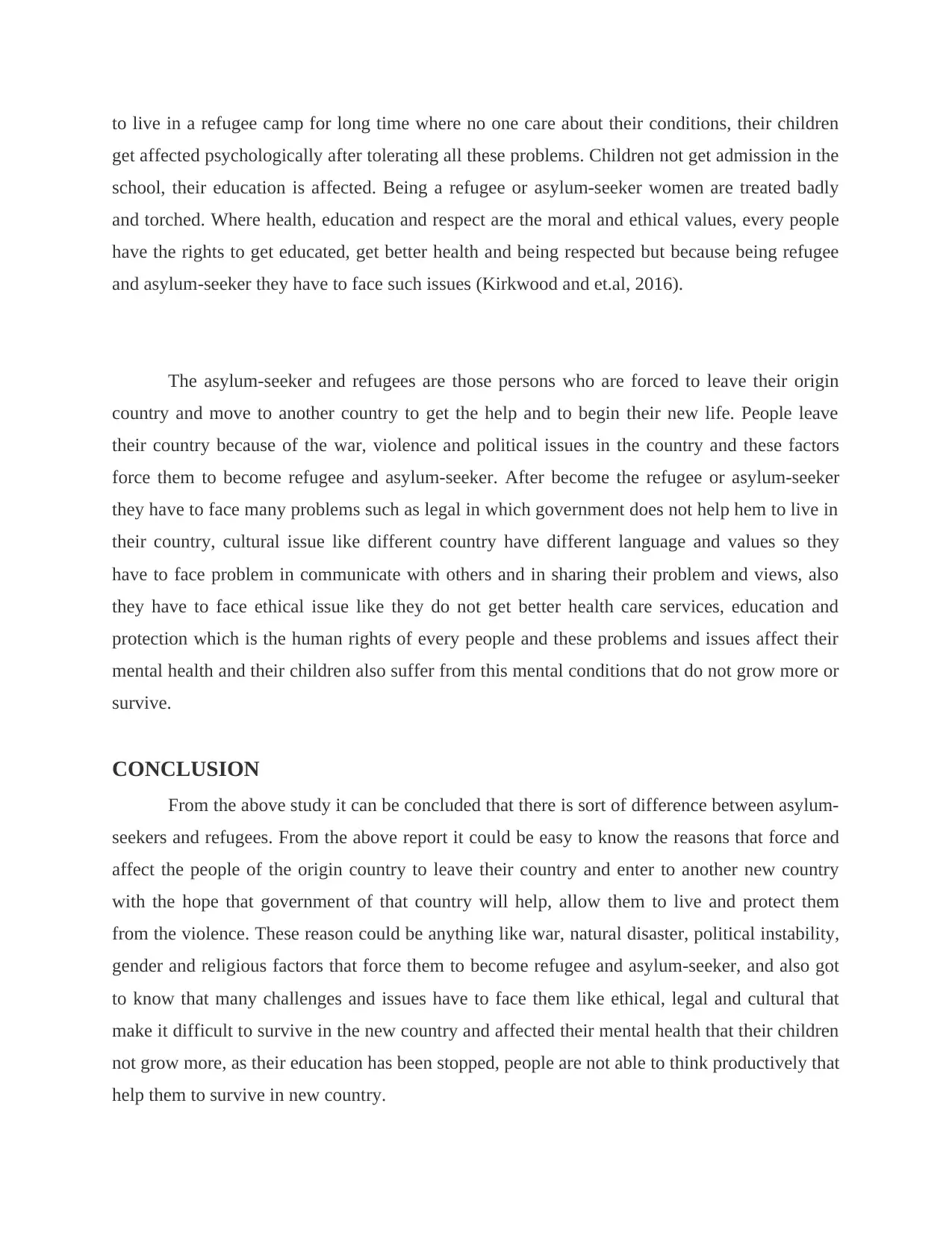
to live in a refugee camp for long time where no one care about their conditions, their children
get affected psychologically after tolerating all these problems. Children not get admission in the
school, their education is affected. Being a refugee or asylum-seeker women are treated badly
and torched. Where health, education and respect are the moral and ethical values, every people
have the rights to get educated, get better health and being respected but because being refugee
and asylum-seeker they have to face such issues (Kirkwood and et.al, 2016).
The asylum-seeker and refugees are those persons who are forced to leave their origin
country and move to another country to get the help and to begin their new life. People leave
their country because of the war, violence and political issues in the country and these factors
force them to become refugee and asylum-seeker. After become the refugee or asylum-seeker
they have to face many problems such as legal in which government does not help hem to live in
their country, cultural issue like different country have different language and values so they
have to face problem in communicate with others and in sharing their problem and views, also
they have to face ethical issue like they do not get better health care services, education and
protection which is the human rights of every people and these problems and issues affect their
mental health and their children also suffer from this mental conditions that do not grow more or
survive.
CONCLUSION
From the above study it can be concluded that there is sort of difference between asylum-
seekers and refugees. From the above report it could be easy to know the reasons that force and
affect the people of the origin country to leave their country and enter to another new country
with the hope that government of that country will help, allow them to live and protect them
from the violence. These reason could be anything like war, natural disaster, political instability,
gender and religious factors that force them to become refugee and asylum-seeker, and also got
to know that many challenges and issues have to face them like ethical, legal and cultural that
make it difficult to survive in the new country and affected their mental health that their children
not grow more, as their education has been stopped, people are not able to think productively that
help them to survive in new country.
get affected psychologically after tolerating all these problems. Children not get admission in the
school, their education is affected. Being a refugee or asylum-seeker women are treated badly
and torched. Where health, education and respect are the moral and ethical values, every people
have the rights to get educated, get better health and being respected but because being refugee
and asylum-seeker they have to face such issues (Kirkwood and et.al, 2016).
The asylum-seeker and refugees are those persons who are forced to leave their origin
country and move to another country to get the help and to begin their new life. People leave
their country because of the war, violence and political issues in the country and these factors
force them to become refugee and asylum-seeker. After become the refugee or asylum-seeker
they have to face many problems such as legal in which government does not help hem to live in
their country, cultural issue like different country have different language and values so they
have to face problem in communicate with others and in sharing their problem and views, also
they have to face ethical issue like they do not get better health care services, education and
protection which is the human rights of every people and these problems and issues affect their
mental health and their children also suffer from this mental conditions that do not grow more or
survive.
CONCLUSION
From the above study it can be concluded that there is sort of difference between asylum-
seekers and refugees. From the above report it could be easy to know the reasons that force and
affect the people of the origin country to leave their country and enter to another new country
with the hope that government of that country will help, allow them to live and protect them
from the violence. These reason could be anything like war, natural disaster, political instability,
gender and religious factors that force them to become refugee and asylum-seeker, and also got
to know that many challenges and issues have to face them like ethical, legal and cultural that
make it difficult to survive in the new country and affected their mental health that their children
not grow more, as their education has been stopped, people are not able to think productively that
help them to survive in new country.

⊘ This is a preview!⊘
Do you want full access?
Subscribe today to unlock all pages.

Trusted by 1+ million students worldwide
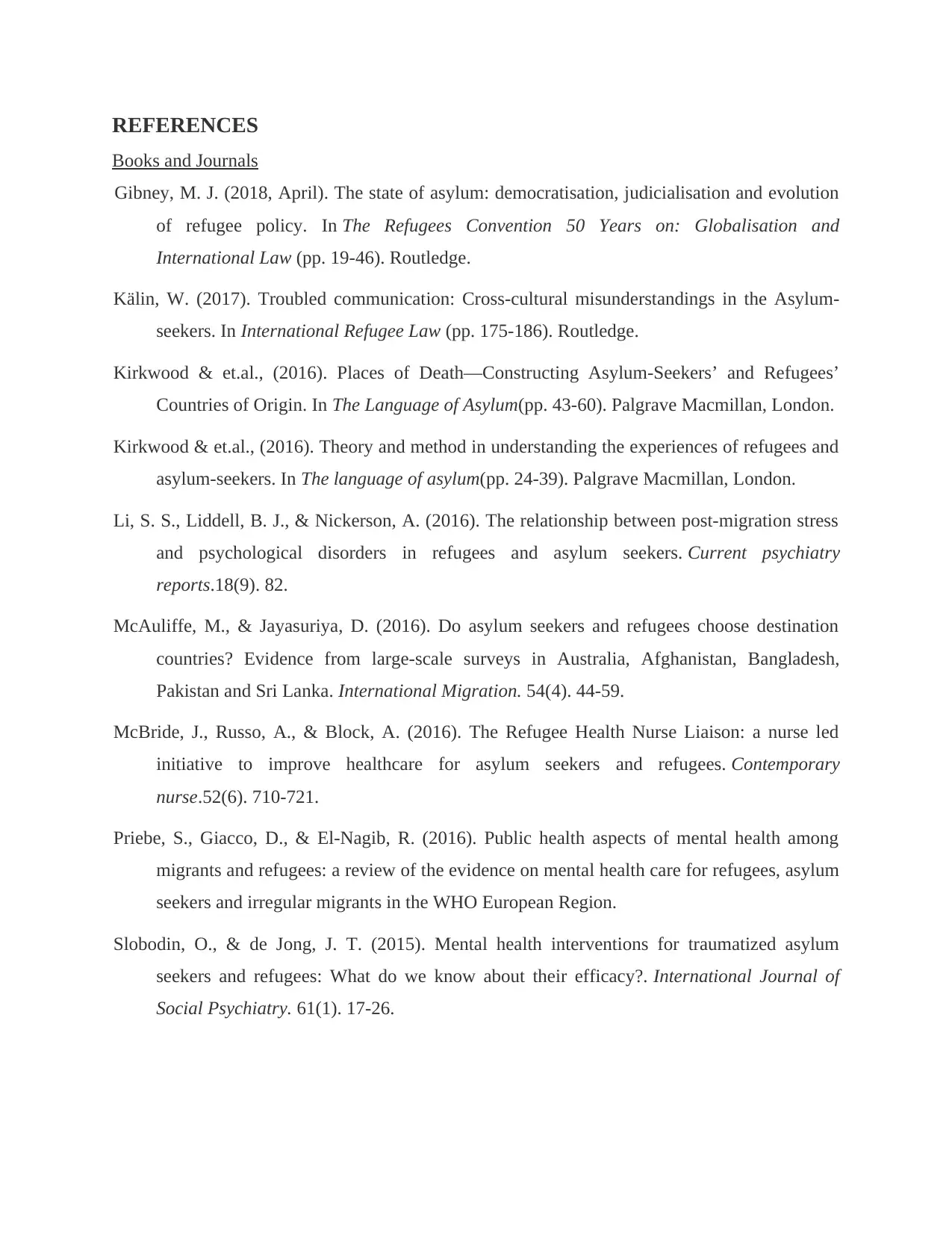
REFERENCES
Books and Journals
Gibney, M. J. (2018, April). The state of asylum: democratisation, judicialisation and evolution
of refugee policy. In The Refugees Convention 50 Years on: Globalisation and
International Law (pp. 19-46). Routledge.
Kälin, W. (2017). Troubled communication: Cross-cultural misunderstandings in the Asylum-
seekers. In International Refugee Law (pp. 175-186). Routledge.
Kirkwood & et.al., (2016). Places of Death—Constructing Asylum-Seekers’ and Refugees’
Countries of Origin. In The Language of Asylum(pp. 43-60). Palgrave Macmillan, London.
Kirkwood & et.al., (2016). Theory and method in understanding the experiences of refugees and
asylum-seekers. In The language of asylum(pp. 24-39). Palgrave Macmillan, London.
Li, S. S., Liddell, B. J., & Nickerson, A. (2016). The relationship between post-migration stress
and psychological disorders in refugees and asylum seekers. Current psychiatry
reports.18(9). 82.
McAuliffe, M., & Jayasuriya, D. (2016). Do asylum seekers and refugees choose destination
countries? Evidence from large‐scale surveys in Australia, Afghanistan, Bangladesh,
Pakistan and Sri Lanka. International Migration. 54(4). 44-59.
McBride, J., Russo, A., & Block, A. (2016). The Refugee Health Nurse Liaison: a nurse led
initiative to improve healthcare for asylum seekers and refugees. Contemporary
nurse.52(6). 710-721.
Priebe, S., Giacco, D., & El-Nagib, R. (2016). Public health aspects of mental health among
migrants and refugees: a review of the evidence on mental health care for refugees, asylum
seekers and irregular migrants in the WHO European Region.
Slobodin, O., & de Jong, J. T. (2015). Mental health interventions for traumatized asylum
seekers and refugees: What do we know about their efficacy?. International Journal of
Social Psychiatry. 61(1). 17-26.
Books and Journals
Gibney, M. J. (2018, April). The state of asylum: democratisation, judicialisation and evolution
of refugee policy. In The Refugees Convention 50 Years on: Globalisation and
International Law (pp. 19-46). Routledge.
Kälin, W. (2017). Troubled communication: Cross-cultural misunderstandings in the Asylum-
seekers. In International Refugee Law (pp. 175-186). Routledge.
Kirkwood & et.al., (2016). Places of Death—Constructing Asylum-Seekers’ and Refugees’
Countries of Origin. In The Language of Asylum(pp. 43-60). Palgrave Macmillan, London.
Kirkwood & et.al., (2016). Theory and method in understanding the experiences of refugees and
asylum-seekers. In The language of asylum(pp. 24-39). Palgrave Macmillan, London.
Li, S. S., Liddell, B. J., & Nickerson, A. (2016). The relationship between post-migration stress
and psychological disorders in refugees and asylum seekers. Current psychiatry
reports.18(9). 82.
McAuliffe, M., & Jayasuriya, D. (2016). Do asylum seekers and refugees choose destination
countries? Evidence from large‐scale surveys in Australia, Afghanistan, Bangladesh,
Pakistan and Sri Lanka. International Migration. 54(4). 44-59.
McBride, J., Russo, A., & Block, A. (2016). The Refugee Health Nurse Liaison: a nurse led
initiative to improve healthcare for asylum seekers and refugees. Contemporary
nurse.52(6). 710-721.
Priebe, S., Giacco, D., & El-Nagib, R. (2016). Public health aspects of mental health among
migrants and refugees: a review of the evidence on mental health care for refugees, asylum
seekers and irregular migrants in the WHO European Region.
Slobodin, O., & de Jong, J. T. (2015). Mental health interventions for traumatized asylum
seekers and refugees: What do we know about their efficacy?. International Journal of
Social Psychiatry. 61(1). 17-26.
Paraphrase This Document
Need a fresh take? Get an instant paraphrase of this document with our AI Paraphraser
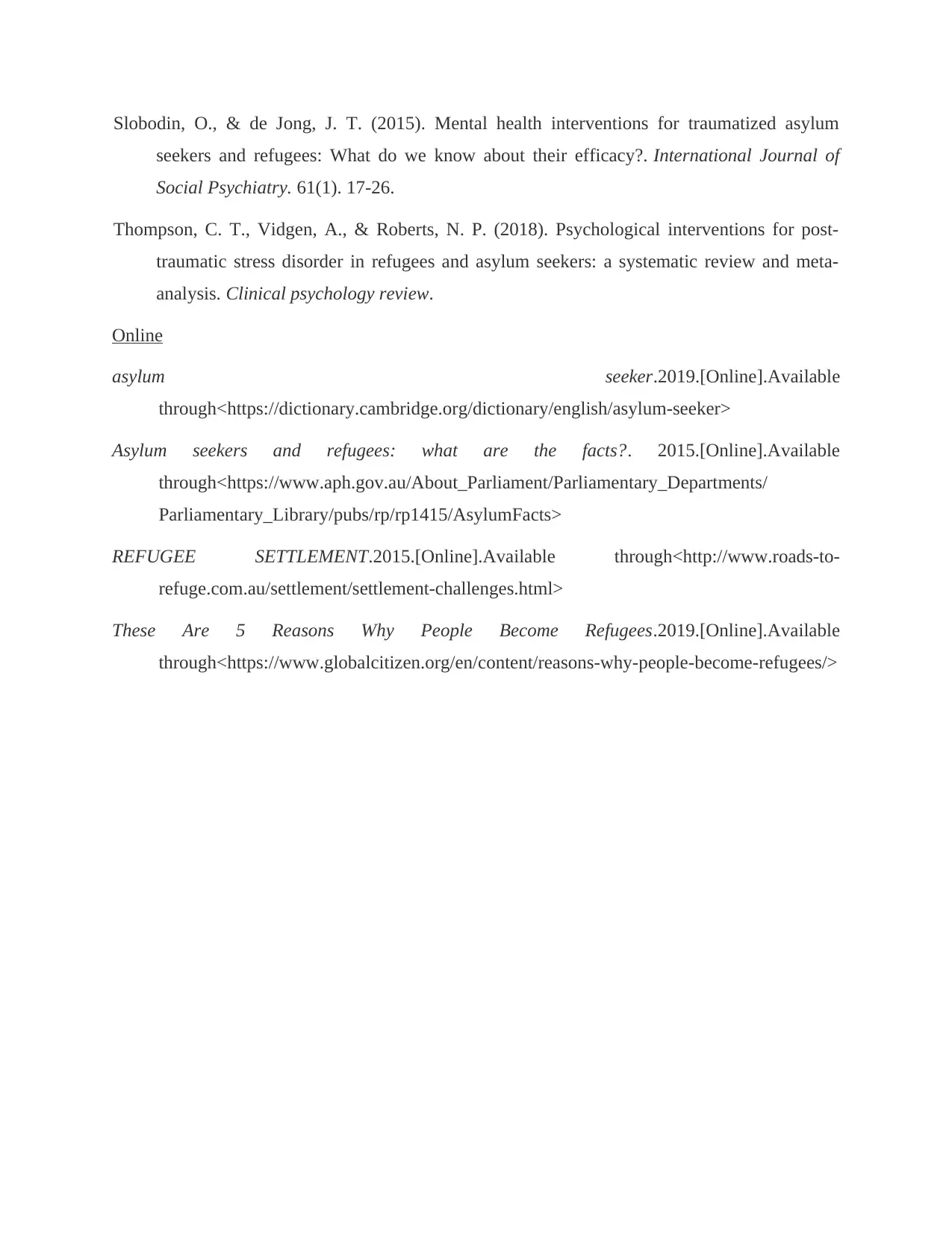
Slobodin, O., & de Jong, J. T. (2015). Mental health interventions for traumatized asylum
seekers and refugees: What do we know about their efficacy?. International Journal of
Social Psychiatry. 61(1). 17-26.
Thompson, C. T., Vidgen, A., & Roberts, N. P. (2018). Psychological interventions for post-
traumatic stress disorder in refugees and asylum seekers: a systematic review and meta-
analysis. Clinical psychology review.
Online
asylum seeker.2019.[Online].Available
through<https://dictionary.cambridge.org/dictionary/english/asylum-seeker>
Asylum seekers and refugees: what are the facts?. 2015.[Online].Available
through<https://www.aph.gov.au/About_Parliament/Parliamentary_Departments/
Parliamentary_Library/pubs/rp/rp1415/AsylumFacts>
REFUGEE SETTLEMENT.2015.[Online].Available through<http://www.roads-to-
refuge.com.au/settlement/settlement-challenges.html>
These Are 5 Reasons Why People Become Refugees.2019.[Online].Available
through<https://www.globalcitizen.org/en/content/reasons-why-people-become-refugees/>
seekers and refugees: What do we know about their efficacy?. International Journal of
Social Psychiatry. 61(1). 17-26.
Thompson, C. T., Vidgen, A., & Roberts, N. P. (2018). Psychological interventions for post-
traumatic stress disorder in refugees and asylum seekers: a systematic review and meta-
analysis. Clinical psychology review.
Online
asylum seeker.2019.[Online].Available
through<https://dictionary.cambridge.org/dictionary/english/asylum-seeker>
Asylum seekers and refugees: what are the facts?. 2015.[Online].Available
through<https://www.aph.gov.au/About_Parliament/Parliamentary_Departments/
Parliamentary_Library/pubs/rp/rp1415/AsylumFacts>
REFUGEE SETTLEMENT.2015.[Online].Available through<http://www.roads-to-
refuge.com.au/settlement/settlement-challenges.html>
These Are 5 Reasons Why People Become Refugees.2019.[Online].Available
through<https://www.globalcitizen.org/en/content/reasons-why-people-become-refugees/>
1 out of 11
Related Documents
Your All-in-One AI-Powered Toolkit for Academic Success.
+13062052269
info@desklib.com
Available 24*7 on WhatsApp / Email
![[object Object]](/_next/static/media/star-bottom.7253800d.svg)
Unlock your academic potential
Copyright © 2020–2025 A2Z Services. All Rights Reserved. Developed and managed by ZUCOL.




